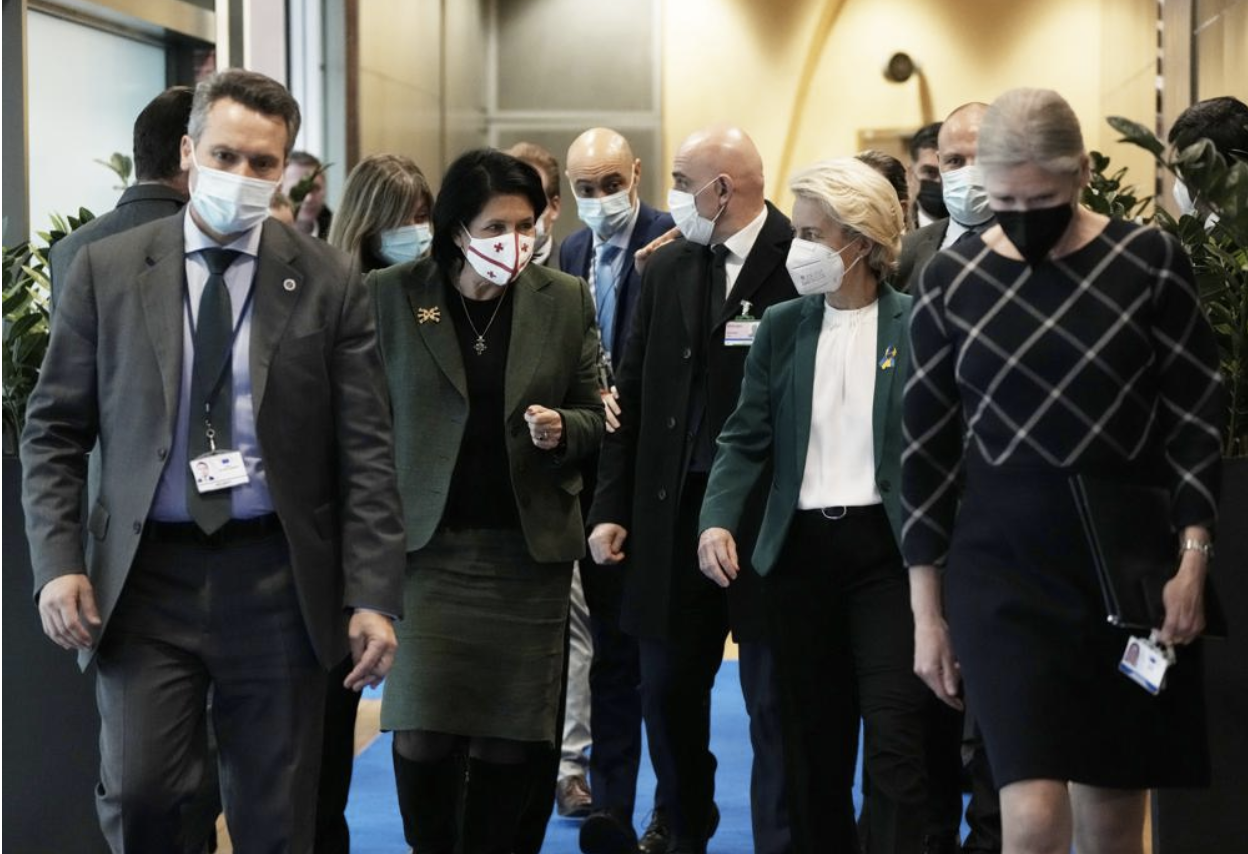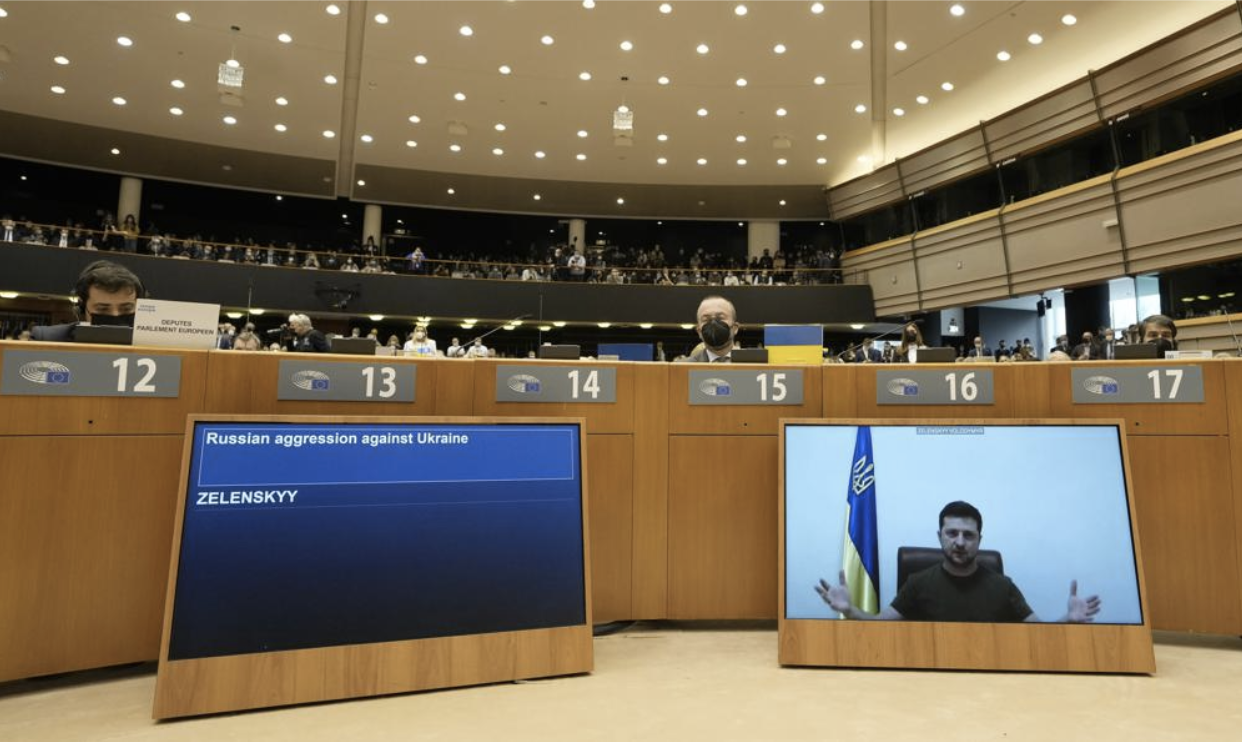European Union Agrees to Begin Examining Accession for Ukraine, Moldova, Georgia
European Commission President Ursula von der Leyen (center right) speaking with Georgian President Salome Zourabichvili (center left) before an EU meeting in Brussels, Belgium on March 1, 2022. Photo: Associated Press/Virginia Mayo
On March 7, the French Presidency of the European Union announced in a tweet that the 27 member nations of the bloc have “agreed to invite the European Commission to present an opinion on each of the applications for EU membership submitted by Ukraine, Georgia and Moldova.” The decision, following Russia’s invasion of Ukraine, has allowed for the lengthy process of EU accession to begin for the three eastern European nations. Each country has requested the EU to quickly consider the matter as the geopolitical landscape rapidly changes amid the war in Ukraine.
The decision made by the EU member states is the first step in the bloc's infamous process for accepting new members, which can take years and even decades. After this, the bloc's executive must present an ‘opinion’ on an applicant, which can also take years to be completed. Member states agree unanimously to allow the applicant to formally become a ‘candidate.’ Once this happens, an over decade long process of reforms and negotiations must be completed in the candidate nation. Ukraine has pleaded for the bloc to allow the nation a faster path to membership as it is confronted with an assault from the Russian military.
Georgia, a former Soviet state residing in the Caucasus mountains sharing a border with Russia to its south, has been put in a very tough position. According to the Financial Times, Georgian President Salome Zourabichvili told the news organization that the EU needs to speed up the beginning of planned EU accession talks for the nation to “shield the country from possible Russian aggression,” and even going as far to say the EU's value stance on Ukraine could have enabled Russian President Vladimir Putin to invade Ukraine.
The decision to apply for EU membership has been a complete reversal in EU accession plans for the nation, as days prior to the decision, the nation stated that they would not attempt to hasten their application. Georgian Prime Minister Irakli Garibashvili also announced that it would not participate in sanctions against Russia because it would economically harm Georgia. However, the day after Ukraine formally applied for EU membership, Georgia decided to follow suit with Moldova and formally apply.
Georgia, having been previously invaded by Russia in 2008, which resulted in almost 200,000 displaced, has left its mark on the population who fear further Russian intervention. For the past couple weeks, the Georgian capital Tbilisi has been rocked by nightlight protests calling for solidarity with Ukraine and resignation of Garibashvili.
Ukrainian President Volodymyr Zelenskyy addressing the European Parliament during a session on Ukraine in Brussels, Belgium on March 1, 2022. Photo: Associated Press/Virginia Mayo
The fear of the Russian invasion not stopping with Ukraine is also present in Moldova, and Moldovan-American psychologist Viorica Marian says these fears are justified. Moldova is a similar nation to Ukraine; both are former Soviet Republics that are not a part of NATO. They are both developing democracies that are building the rule of law and strengthening free speech and assembly. However, Moldova also contains Transnistria, a breakaway portion of its territory that Russia claims is sovereign. As Donbass and Luhansk were used to justify war with Ukraine, Transnistria in the east of Moldova is important to Putin's view of security and could very likely be used as justification for an invasion of Moldova.
The decision to apply for EU membership is a contentious topic in Moldova too. The current government, led by pro-European President Maia Sandu made the decision to apply, much to the dismay of former pro-Russian President Igor Dodon and his supporters, who hold 32 seats of the 101 seat parliament. Both politically and geographically, Moldova is split on whether to side with Russia or the EU; Transnistria remains a pro-Russian territory, while the rest of the population doesn't seem to have reached a consensus on whether or not allying with Russia or the EU will improve their quality of life. For the moment, the pro-European government has the reins, holding the presidency and 63 seats in parliament.
According to a group of Members of European Parliament (MEP) from the liberal Renew Europe European political group, Ukrainian and potentially Molvodovan and Georgian accession to the EU is paramount to the defense of Europe, freedom, and the rule of law. Within the Treaty on the European Union "'any European country' can apply for membership, provided it will respect the European values laid down in Art 2 and that it is committed to promoting those values." The MEPs say that Ukraine is already doing so in the war between them and Russia.
Not only must Ukraine be accepted for the betterment of Europe, but the process of EU accession must be reformed to not only be for economics, but for geopolitical strategy. According to the MEPs, accepting Ukraine into the EU “does not mean lowering our standards in any way. The accession process should encompass more than just the particular moment of accession, but rather permanent adjustment and improvement of all member states.”
Although many EU member states support Ukraine, granting membership to the nation is not going to be an easy or quick task. Dutch Prime Minister Mark Rutte clarified that the process for Ukrainian EU accession will not be something for the short term and that the process would take years, and that they should worry about what they can do tomorrow and the next day. Rutte further declared that membership for Moldova and Georgia are not poised to receive membership before Ukraine because they are not actively being invaded.
However, the MEPs from Renew Europe state that this slow process is a crutch while Russian President Vladimir Putin is trying to expand his influence on the world and rearrange political order. To them, this begs the question: “Can [the EU] really allow [themselves] to reply ‘let’s talk in a few years’”?


